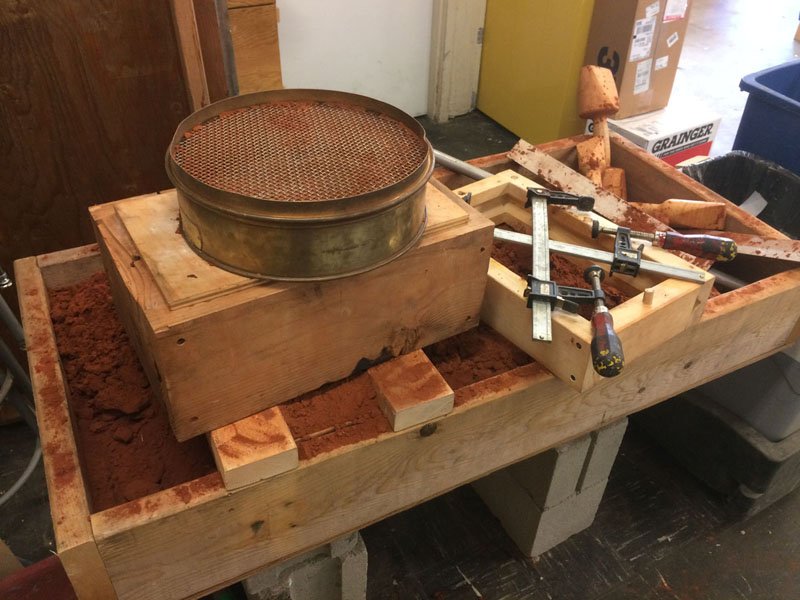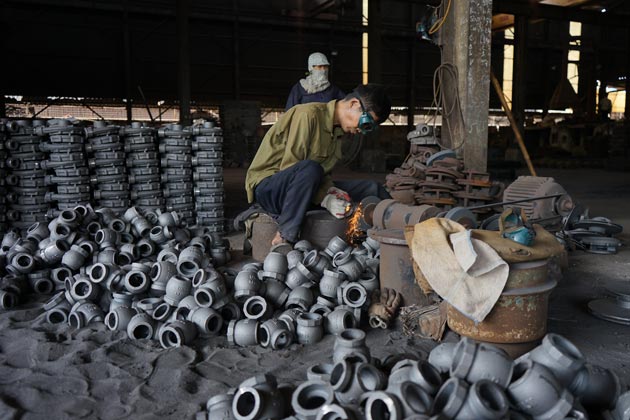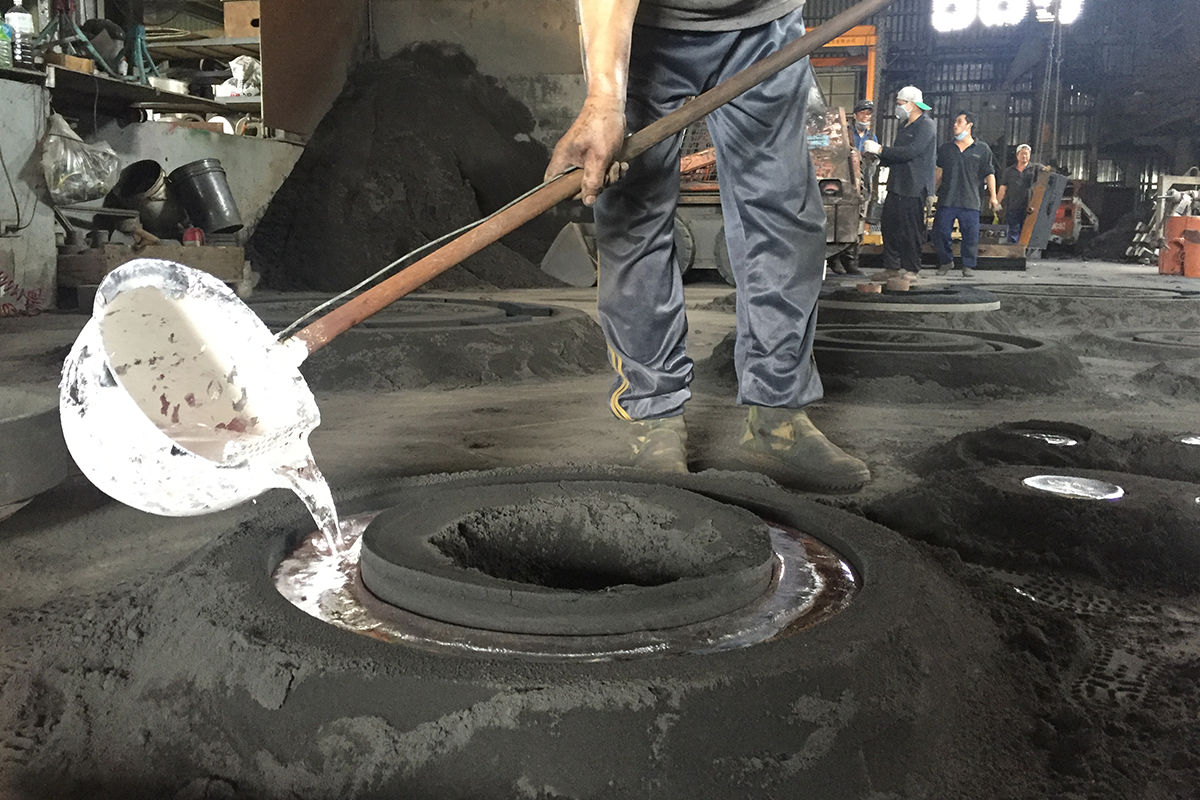Understanding the Perks and Innovations in the Aluminum Foundry Market
The Aluminum Foundry sector plays a vital duty in contemporary manufacturing. Its lightweight residential or commercial properties especially improve gas effectiveness, particularly in aerospace and automotive sectors. Additionally, Aluminum's resistance to deterioration assurances durability in numerous applications. As the sector advances, technologies such as sophisticated recycling and additive production are improving manufacturing approaches. Checking out these innovations discloses not just the benefits but likewise the difficulties in advance for Aluminum foundries in a quickly altering market.
The Lightweight Advantage of Aluminum
Aluminum's lightweight nature supplies substantial benefits throughout various markets, particularly in manufacturing and transport. Its reduced thickness enables the production of elements that are easier to deal with and mount, leading to minimized labor costs and boosted efficiency. In the automobile field, lighter lorries add to improved fuel economic situation and lower discharges, straightening with global sustainability goals. Likewise, in aerospace, making use of Aluminum lowers the general weight of aircraft, which is vital for improving efficiency and minimizing operational expenses.
In addition, Aluminum's lightweight properties help with innovative designs that were formerly impossible with larger products. This versatility allows suppliers to develop intricate shapes and frameworks while keeping structural integrity. Generally, the lightweight advantage of Aluminum not just improves item efficiency however likewise drives improvements in technology and style, making it a recommended material in different applications.
Corrosion Resistance and Durability
The Aluminum Foundry market is renowned for producing materials with remarkable deterioration resistance, making them excellent for different applications. This property, combined with boosted architectural stability, adds to the resilient performance benefits that Aluminum parts offer. Because of this, industries increasingly depend on Aluminum to satisfy demanding ecological conditions without endangering high quality.
Superior Corrosion Resistance
While different steels encounter substantial challenges from ecological elements, Aluminum attracts attention for its superior corrosion resistance, making it a preferred option in numerous applications. This property is largely due to an all-natural oxide layer that bases on the Aluminum surface, providing a barrier versus dampness and harsh agents. Unlike various other metals that may rust or weaken over time, Aluminum maintains its integrity also in extreme settings, such as coastal locations or industrial settings. Furthermore, its lightweight nature integrated with corrosion resistance makes it ideal for applications in aerospace, vehicle, and marine sectors. Generally, Aluminum's phenomenal resilience not just boosts item long life yet additionally minimizes upkeep expenses, providing an engaging advantage for consumers and producers alike.
Boosted Architectural Stability
Developers and engineers increasingly acknowledge the value of enhanced structural stability in modern-day applications, where both corrosion resistance and toughness are essential. Aluminum alloys, understood for their lightweight buildings, likewise exhibit extraordinary resistance to deterioration, making them suitable for rough settings. The cutting-edge methods utilized in the Aluminum Foundry sector contribute significantly to producing elements with boosted durability. Advanced casting procedures and alloy make-ups are tailored to meet specific efficiency demands, guaranteeing that structures can endure extreme problems without jeopardizing stability. Surface treatments and finishes improve the life expectancy of Aluminum products, better minimizing deterioration over time. This focus on boosted structural honesty not only expands the usability of materials yet also minimizes maintenance costs, strengthening Aluminum's position as a product of option in various industries.
Lasting Efficiency Advantages
Resilient performance in Aluminum elements is greatly credited to their premium deterioration resistance and resilience. Unlike lots of metals, Aluminum normally develops a protective oxide layer, which prevents rust and deterioration in various atmospheres, consisting of aquatic and industrial settings. This fundamental home considerably expands the lifespan of Aluminum items, decreasing maintenance and replacement prices. In enhancement, the light-weight nature of Aluminum improves its applicability across industries without endangering strength. The material's resistance to damage likewise adds to its reliability sought after applications, making it an optimal choice for auto, aerospace, and building and construction markets. As industries increasingly prioritize sustainability and longevity, Aluminum's performance advantages line up with modern-day design needs, strengthening its role in ingenious manufacturing processes.
Ecological Influence and Sustainability
 As the Aluminum Foundry industry progresses, it significantly prioritizes environmental effect and sustainability, identifying the demand for responsible methods despite environment change. Initiatives to reduce waste and power intake go to the forefront, with lots of shops embracing reusing initiatives to reclaim Aluminum scrap. This not only reduces basic material use yet additionally notably reduces down power expenditure, as recycled Aluminum requires just a portion of the energy compared to primary production.
As the Aluminum Foundry industry progresses, it significantly prioritizes environmental effect and sustainability, identifying the demand for responsible methods despite environment change. Initiatives to reduce waste and power intake go to the forefront, with lots of shops embracing reusing initiatives to reclaim Aluminum scrap. This not only reduces basic material use yet additionally notably reduces down power expenditure, as recycled Aluminum requires just a portion of the energy compared to primary production.Additionally, developments in emissions manage innovations are being applied to decrease air toxins, lining up operations with stricter environmental guidelines. Factories are additionally checking out different power sources, such as solar and wind, Clicking Here to power their facilities sustainably. By promoting partnership with stakeholders, the market aims to create cutting-edge remedies that improve environmental stewardship. Collectively, these efforts highlight a dedication to minimizing the Aluminum Foundry's carbon footprint while promoting a circular economic climate within the manufacturing sector.
Advanced Production Techniques
 Reinventing production procedures, the Aluminum Foundry market is increasingly incorporating advanced manufacturing techniques to boost effectiveness and accuracy. Techniques such as computer numerical control (CNC) machining and additive manufacturing have actually arised as vital elements in maximizing production operations. CNC machining permits high-precision part construction, significantly lowering material waste and manufacturing time. Additive manufacturing opens brand-new avenues for intricate geometries and lightweight styles that were formerly challenging to attain.
Reinventing production procedures, the Aluminum Foundry market is increasingly incorporating advanced manufacturing techniques to boost effectiveness and accuracy. Techniques such as computer numerical control (CNC) machining and additive manufacturing have actually arised as vital elements in maximizing production operations. CNC machining permits high-precision part construction, significantly lowering material waste and manufacturing time. Additive manufacturing opens brand-new avenues for intricate geometries and lightweight styles that were formerly challenging to attain.Additionally, the deployment of automation and robotics in Aluminum factories streamlines operations, minimizes human mistake, and boosts worker security. These modern technologies facilitate a more receptive manufacturing environment, allowing makers to adapt rapidly to market demands. The combination of advanced simulation software application additionally boosts the layout and screening phases, resulting in exceptional item high quality. Jointly, these techniques not just improve operational effectiveness but likewise foster technology, positioning the Aluminum Foundry industry at the center of modern manufacturing.
Developments in Recycling Procedures
The Aluminum Foundry sector is not just advancing in producing methods however is also making significant strides in reusing procedures. Technologies are arising to enhance the performance of recycling methods, lowering power consumption and boosting sustainability. Advanced sorting innovations, such as automated optical sorting, make it possible for the identification and separation of Aluminum from other products with high accuracy. This results in a higher top quality of recycled Aluminum, which is vital for keeping the stability of the end products.
Closed-loop recycling systems are being executed, enabling producers to recycle Aluminum scrap within their very own production procedures. This lessens waste and promotes a round economy. Additionally, research study right into new recycling strategies, such as hydrometallurgical processes, provides the possibility for recovering Aluminum from intricate waste streams. These technologies not only add to minimizing the carbon impact of the Aluminum Foundry sector yet also reinforce its economic stability in a significantly ecologically aware market.
Applications Throughout Numerous Industries
Many industries are increasingly acknowledging the versatility and benefits of Aluminum Foundry items, resulting in extensive applications throughout markets such as automotive, consumer, building, and aerospace products. In the vehicle industry, Aluminum spreadings add to light-weight vehicle designs, boosting fuel efficiency and performance. Aerospace producers make use of Aluminum elements for their strength-to-weight ratio, crucial for airplane frameworks and elements.
In building and construction, Aluminum is preferred for its durability and resistance to corrosion, making it excellent for window frames, roofing, and structural supports. Consumer products also gain from Aluminum Foundry products, as seen in cookware, electronics, and packaging, where lightweight and recyclable materials are important.
The versatility of Aluminum Foundry strategies enables detailed styles and exact specs, dealing with the diverse needs of these sectors. Consequently, Aluminum Foundry products are coming to be integral to modern-day production procedures throughout various sectors.
Future Fads in Aluminum Foundries
As industries proceed to advance, Aluminum factories are poised to welcome several vital patterns that promise to boost effectiveness and sustainability. One famous pattern is the increasing fostering of digital modern technologies, including automation and expert system, which improve procedures and enhance quality control. Additionally, the push towards sustainable methods is leading foundries to purchase recycling technologies, significantly lowering waste and energy intake.
 Another emerging trend is making use of advanced alloys and materials, dealing with the expanding need for lightweight and sturdy elements throughout various industries (Aluminum Foundry). In addition, have a peek here the integration of additive manufacturing techniques is prepared for to transform component layout, offering personalization and minimizing preparations
Another emerging trend is making use of advanced alloys and materials, dealing with the expanding need for lightweight and sturdy elements throughout various industries (Aluminum Foundry). In addition, have a peek here the integration of additive manufacturing techniques is prepared for to transform component layout, offering personalization and minimizing preparationsCooperation with study establishments is also expected to drive development, as factories seek to establish brand-new procedures and products. Aluminum Foundry. Jointly, these patterns suggest a transformative future for the Aluminum Foundry sector, straightening with more comprehensive objectives of sustainability and efficiency
Frequently Asked Questions
What Are the Common Expenses Related To Aluminum Foundry Production?
The common expenses connected with Aluminum Foundry production include resources, labor, energy, equipment upkeep, and overhead expenditures. These variables jointly affect the general monetary investment needed for efficient Aluminum casting procedures.
Exactly How Does Aluminum Contrast to Various Other Metals in Strength?
Aluminum, while lighter than many steels, displays YOURURL.com outstanding strength-to-weight ratios. Compared to steel, Aluminum is much less solid however uses exceptional rust resistance, making it a positive option in applications where weight and toughness are essential.
What Safety Measures Remain In Area in Aluminum Foundries?
Security measures in Aluminum shops normally consist of compulsory personal safety devices, air flow systems to regulate fumes, routine equipment upkeep, training programs for employees, and adherence to rigorous safety and security guidelines to minimize threats connected with liquified metal handling.
How Is Top Quality Control Managed in Aluminum Casting Processes?
Quality assurance in Aluminum casting processes entails rigorous examinations at different stages, consisting of raw material analysis, process tracking, and final product testing. Methods such as analytical process control and non-destructive screening warranty adherence to industry requirements.
What Certifications Are Essential for Aluminum Foundry Vendors?
The importance of accreditations for Aluminum Foundry vendors consists of ISO 9001 for quality monitoring, ISO 14001 for environmental monitoring, and industry-specific requirements like ASTM and SAE, making certain compliance, security, and dependability in producing procedures.
The Aluminum Foundry industry plays a necessary duty in contemporary manufacturing. The Aluminum Foundry market is renowned for creating products with exceptional rust resistance, making them perfect for numerous applications. Revolutionizing production processes, the Aluminum Foundry industry is increasingly integrating innovative manufacturing strategies to boost efficiency and precision. The Aluminum Foundry market is not only progressing in making methods but is also making considerable strides in recycling processes. As industries continue to develop, Aluminum factories are poised to accept several vital trends that promise to enhance performance and sustainability.